
- Display 15 Products per page
-
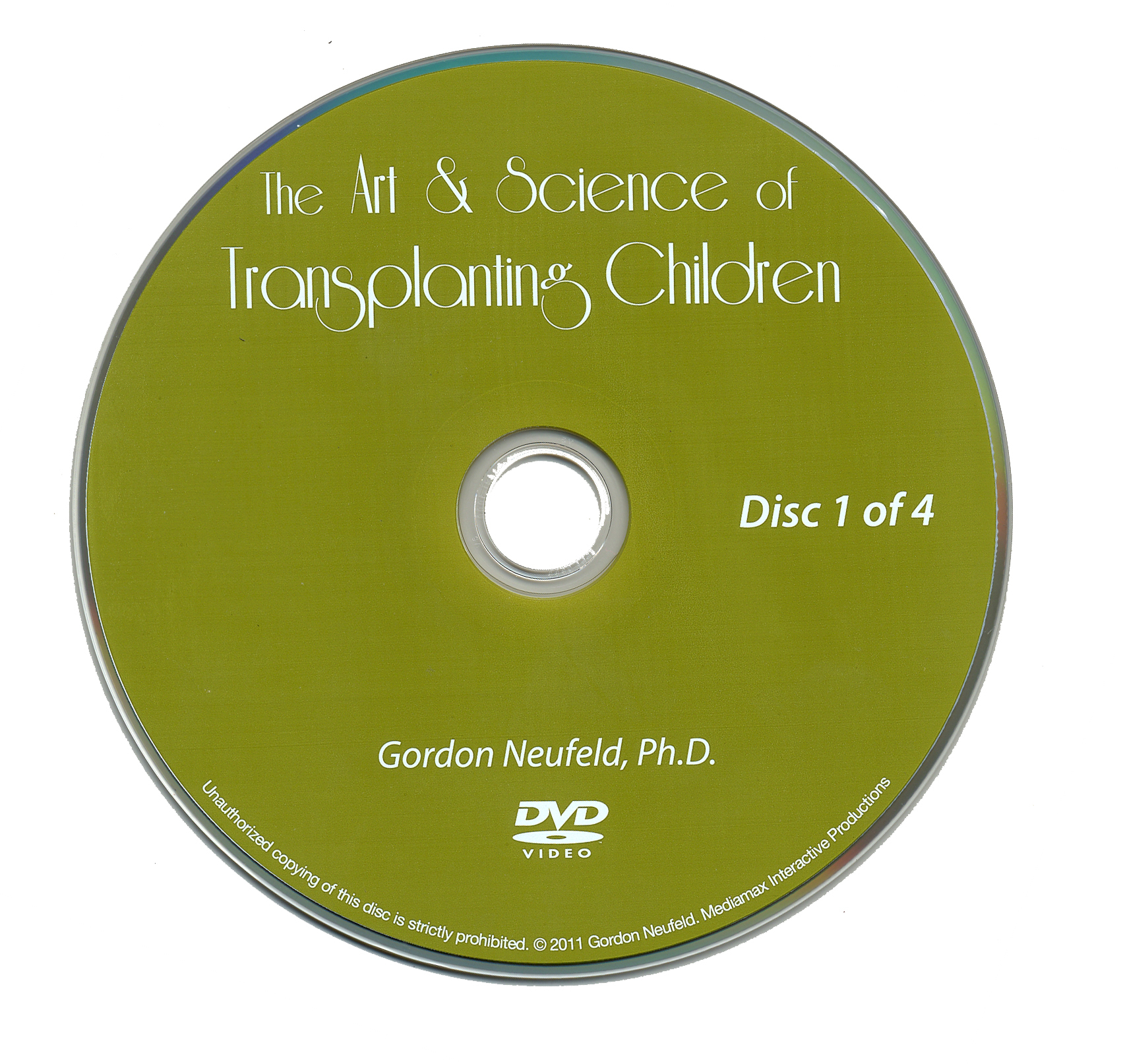
The Art and Science of Transplanting Children
Video, 2011
This course explores the attachment needs of children and how these can become disrupted when a child is moved into a new environment. Each presentation is designed so that the material builds on the information learned in previous presentations. This course is suitable for anyone working with children or who is responsible for making policy decisions regarding children who are placed into care. This can be used for individual professional development or could be used as a series of one-hour staff development sessions. Foster and adoptive parents will also benefit from this information.
SKU: 8-V-808 -

Elijah’s Story
Video, 2000
Elijah’s Story is the true story of a 16-month-old baby boy who was shaken to death by his biological father. The film follows the young family from the birth of Elijah to the 911 emergency call and sentencing hearing. Testimonies are given by Elijah’s mom and grandparents, as well as by the doctor, detective, and judge in the case. Elijah’s mom shares her emotions as she tries to go on, and Elijah’s dad speaks out from prison, encouraging others to learn from his mistakes.
SKU: 4-V-402 -

For the Child: Information on Mental Health and Advocacy for Resource Parents (I Am Your Child Series)
Video, 2007
- Understand the most common children’s mental health problems
- Navigate the local mental health service delivery system
- Develop alliances with birth parents, school systems, mental health providers, and case workers
- Feel increased comfort with seeking mental health services
- Recognize the rights and responsibilities of foster children, birth parents, kinship providers, foster parents, and caseworkers
- Identify who to call, what to say, and where to go to obtain the right services for the children in their care
- Be an effective advocate for the children in their care
SKU: 5-V-516 -

Power to Parent: Common Challenges
Video, 2011
Dr. Neufeld discusses ways to address challenging behaviour in children while maintaining attachment relationships. The eight sessions are as follows:
- Thinking developmentally when facing challenges
- Recognizing the signs of trouble
- Living with a sensitive child
- Cultivating resilience in a child
- Leading an alpha child
- Disciplining a stuck child
- Putting the developmental approach into practice
SKU: 8-V-807 -

Making Sense of Play
Video, 2011
In this two-hour seminar, Dr. Gordon Neufeld explores what play is, the benefits of play, and what is needed for children to play. Dr. Neufeld explains that play is not an option; it is a developmental requirement. Through various examples, he explores the three basic tenants of play: 1) Play is not work, 2) Play is expressive and exploratory, and 3) Play is “not for real”.
SKU: 8-V-803 -

Your Choices Matter Lesson Plans
Lesson Plans, 2020
For use in conjunction with the Your Choices Matter Video and Facilitator’s Guide, the Your Choices Matter Lesson Plans are a way to take the discussion of infant mortality and health behaviours a step further. Each lesson addresses common risk factors for infant mortality and can help guide discussion about the impact of these risk factors for youth today and in the future, and for their future children. Each lesson has been linked to the Saskatchewan Curriculum and, where applicable, includes marking rubrics.
The Facilitator’s Guide and Lesson Plans can be used to engage youth and communities to have conversations about health and behaviour choices that they are making today to ensure the best health outcomes for themselves and their future children. The Guide provides background information and several lesson plans, which can be used in the classroom or in a group setting, to address the various topics introduced in the video.
Order or download the Your Choices Matter Facilitator’s GuideSKU: 2-121 -
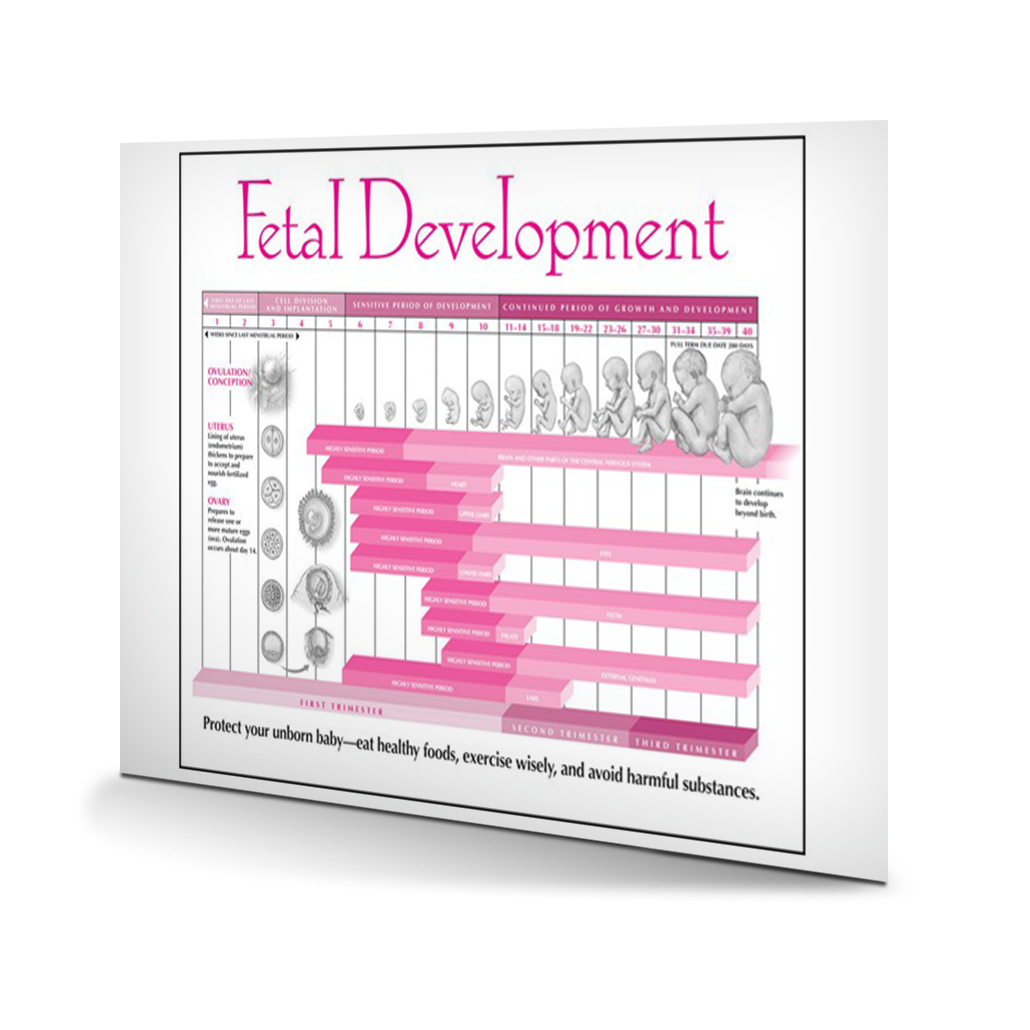
Fetal Development
Poster, 2008
These 8.5 x 11 inch posters, developed by Childbirth Graphics, assist healthcare professionals in discussing alcohol use with their patients. Although these posters do not focus on FASD, they can be used to help patients understand that alcohol is one of many factors which can impact the development of the fetus.
Audience: Healthcare Professionals and their PatientsSKU: 3-143 -
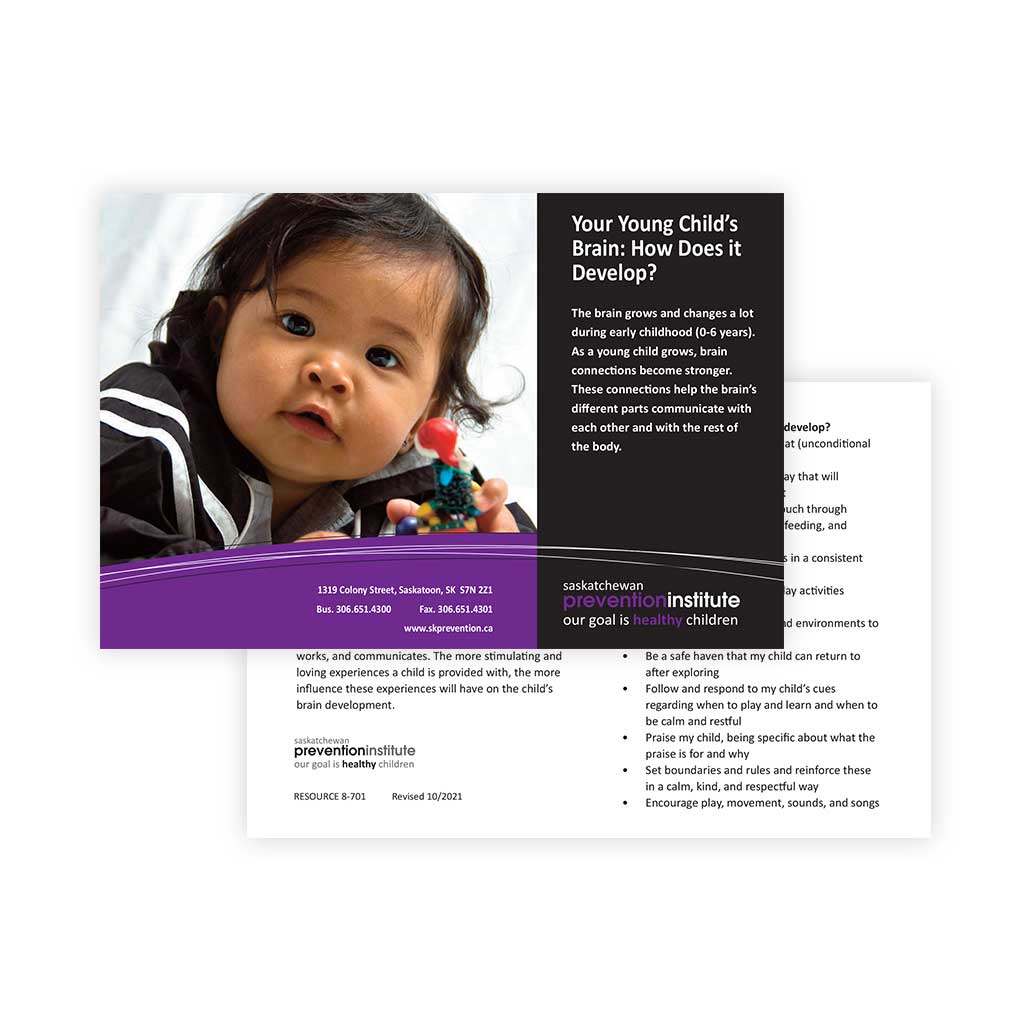
Your Young Child’s Brain: How Does It Develop?
Information Card, Revised 2021
Written in plain language, this information card provides basic information about the importance of brain development during the early years. Practical tips to increase opportunities for children’s healthy development are included.
SKU: 8-701 -
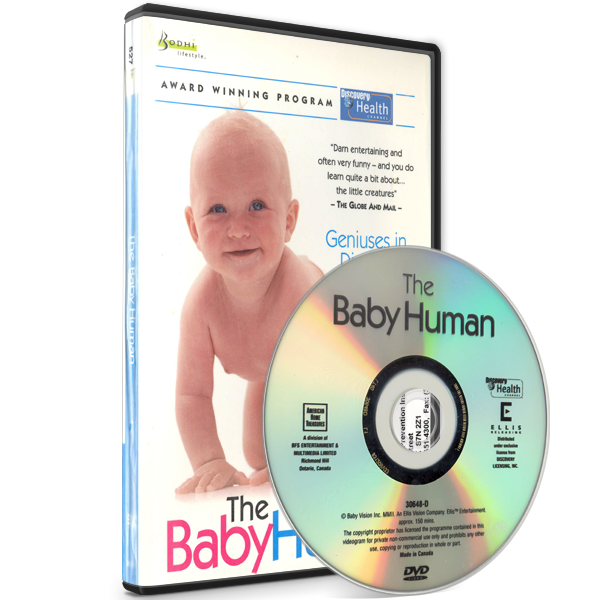
The Baby Human
Video, 2004
Imagine you’re suddenly thrust into a world where you can’t speak, can barely move, and must unravel the meaning behind a maze of sounds and sights in order to survive. This is the world of the baby.
For the first time, experience the first two years of a child’s life just as they do. This groundbreaking program reveals what only the little ones know. What is their most profound need? How do they REALLY see their parents? What does it feel like to struggle to walk or learn to speak?
It’s an incredible journey each of us has taken – but none of us remember. Get a carpet-and-crib-eye view of the baby’s world as they take their first humorous, death-defying, wondrous steps into life.
Episodes include: To Walk, To Think, and To Talk. Also includes segments on baby trivia, and common baby names and their meanings.
SKU: 5-V-527 -

When Your Baby Can’t Stop Crying
Brochure, Revised 2019
Although infant crying is normal, it can be very frustrating for caregivers. This brochure identifies strategies for dealing with a crying infant, as well as strategies for handling caregivers’ frustration. Ideal for use with all caregivers. For information aimed at professionals and service providers, see Abusive Head Trauma (Shaken Baby Syndrome) (resource 4-900).
SKU: 4-902 -

The Heart of Learning
Video, 1999
Much of the way children think and feel about themselves and their world is determined in the first three years of their lives. In this formative time, the brain is developing a complex “wiring” system, making connections that will strongly influence children’s patterns of emotional, social, and psychological behaviour – and how well they can learn, handle stress, thrive, and function in the world. The video kindles deep, natural parenting instincts, while providing clear and accessible strategies for loving and nurturing interaction with children.
SKU: 5-V-508 -
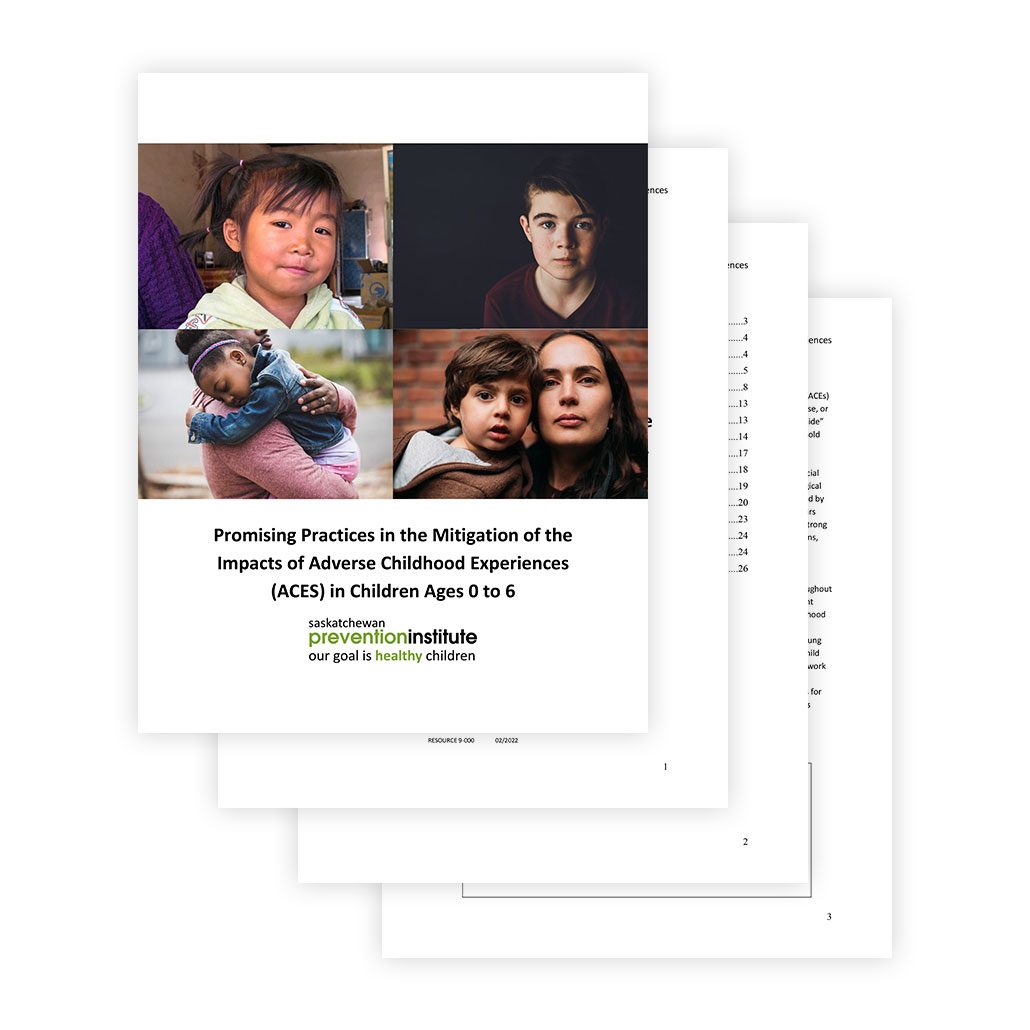
Promising Practices in the Mitigation of the Impacts of Adverse Childhood Experiences (ACES) in Children Ages 0 to 6
Report, 2022
Adverse childhood experiences (ACEs) are childhood events that cause harm or distress and, as a result, disrupt the child’s health and development. The purpose of this report is to define ACEs and their impact on development, health, and well-being; describe how ACEs are identified in children ages 0 to 6; and investigate evidence-based practices being used with children ages 0 to 6 and parent/caregiver-child dyads to mitigate (make less severe or harmful) the impacts of ACEs in childhood and beyond.
“In November 2022 an Executive Summary was added to the report”.
SKU: 9-000 -

Your Choices Matter Facilitator’s Guide
Guide and Manual, Revised 2020
In conjunction with the Your Choices Matter Video, the Facilitator’s Guide can be used to engage youth and communities to have conversations about health and behaviour choices that they are making today to ensure the best health outcome for themselves and their future children. The guide provides background information and several lesson plans, which can be used in the classroom or in a group setting, to address the various topics introduced in the video.
While the Your Choices Matter Video is meant to introduce the topic of infant mortality and health behaviours, the lesson plans are a way to take this a step further. Each lesson addresses common risk factors for infant mortality and can help guide discussion about the impact of these risk factors for youth today and in the future, and for their future children. Each lesson has been linked to the Saskatchewan Curriculum and, where applicable, includes marking rubrics.
Download the Your Choices Matter Lesson PlansSKU: 2-120 -

Challenging Behaviors in Young Children: Techniques and Solutions
Video, 2004
This DVD highlights expert information from two books Challenging Behaviors in Early Childhood Classroom Settings: Creating a Place for all Children and Addressing Challenging Behaviors in Early Childhood Settings: A Teacher’s Guide. The DVD uses footage from a daycare setting to highlight concepts that are introduced by experts throughout the film. Special attention is paid to methods that can be used to teach young children how to problem solve.
Audience: Parents and Early Childhood EducatorsSKU: 8-V-814 -
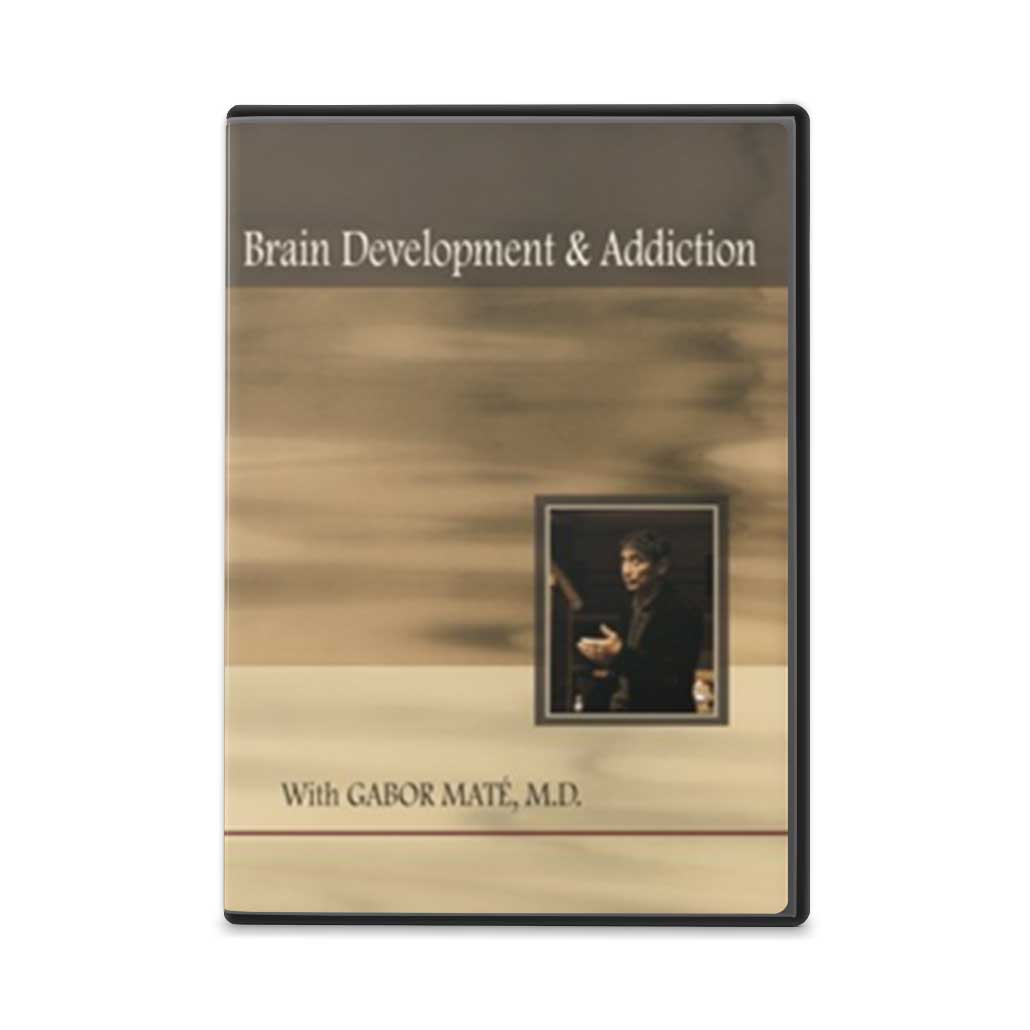
Brain Development & Addiction
Video, 2009
Gabor Maté, M.D. provides a clear explanation of addiction and its crucial relationship to brain development in early childhood and associated environmental conditions. Through a synthesis of clinical experience, cutting edge brain research, and spiritual teachings, Dr. Maté describes why we seek such destructive ways to comfort ourselves and why it is so difficult to stop. He explains the 4 basic systems involved with healthy development, as well as addiction, and why they are so powerful. Dr. Maté proposes a compassionate approach to healing and suggests that we need to widen our lens to look at the conditions in the world that drive and promote addiction versus health and balance.
SKU: 8-V-816
